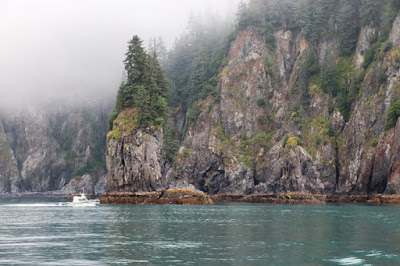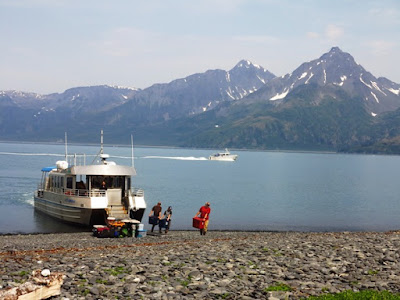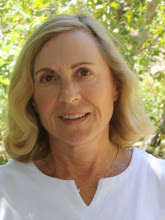 |
| Ice and glaciers attract visitors to Kenai Fjords National Park. |
If you look at a map of Kenai Fjords National Park
you see jagged fingers of land jutting from the Harding Icefield into the Gulf
of Alaska. You’d be right if you thought ice was the mainstay of this 600,000
acre park. Thousands of feet below what you see on the surface is a concealed
mountain range, a relic from the last Ice Ag, a glimpse into a time when ice
covered much of North America.
More recently, activity such as a massive 3-day
eruption in 1912 caused Mount Kenai to collapse inward on itself creating a
caldera (crater). Snow fell and settled in the bowl creating a glacier and more
stunning scenery. But there’s much more to this glacier-filled land.
 |
| Jagged rocks form coastal Kenai Fjords |
As glaciers moved, they slowly carved valleys that
filled with sea water and formed the beautiful fjords. This strange and
wonderful landscape is evidence of nature’s raw sculpting power. It’s a place
where birds swim better than they fly, mammals must adapt to life in frigid
salt water, and wildlife including orca, otters, and salmon are the prime inhabitants.
 |
| Abundant wildlife |
Wedged between crashing waves of the sea and the frozen
Icefield, a narrow slice of temperate rain forest teems with wildlife. Moose,
bears, and mountain goats inhabit the lush, green spaces at the edge of the
Kenai Fjords. Majestic mountain peaks just beyond the trees provide a starting
point for the glaciers, some of which now slide into the jagged fjords.
 |
| Surprisingly green rain forest landscape |
This is the land we chose to visit while in Alaska—staying
at a quiet, isolated retreat called Kenai Fjords Glacier Lodge. It’s a place
that challenges your senses. Waterfalls, bird calls, and a swooshing eagle
create a symphony of nature sounds.
 |
Intricate patterns of ice in Ailik Glacier. Chunks regularly calve
(drop off) into the water. |
The
thundering boom of a calving glacier, furry otters tummy side up rolling in the
waves, hazy fog and pelting rain, and sunshine glistening on forest ferns are
all nature’s way to awaken your senses.
 |
| Bright firewood was in full bloom. Gorgeous landscapes |
But there’s also a tranquility that soothes the soul
and refreshes the spirit. Summery fields of pink-flowered fireweed, dewy mosses
growing under a canopy of spruce and alder trees—and a quiet that comes from existing
without traffic, technology, and ticking clocks.
We gladly left behind the treasures of modern
society so we could discover and experience nature’s treasures without
distractions. That meant getting outdoors, no matter what the weather—kayaking
in the rain, hiking through puddles left by previous downpours, and canoeing
through fog that made us focus on what was right in front of us when we paddled
in Peterson Lagoon. Yes, it was cold and wet at times, but it was also warm and
sunny. The climate that shaped this place continues to keep it wild and
wonderful.
 |
| Beautiful Ailik Glacier that we kayaked to one day |
Our boat ride to the Lodge had lasted 5 hours because
we spent a good bit of time looking for wildlife—which we easily found. Humpback
whales migrate to these waters from Hawaii every summer. Sea otters abound in
the frigid waters. Harbor seals don’t mind if the weather is dreary. Orcas, or
killer whales, provided a spectacular show just as the boat approached the
front of Aialik Glacier. We were awed by the incredible beauty of this
place—and took too many photos.
 |
| The Lodge is hidden in a natural setting, so we had a short hike to get there. |
Too soon the captain guided the boat to a beach
where we got off and walked half a mile to the hidden Lodge.
 |
| Our cabin |
This was a good day made even better by the incredible
beauty of mountains and water surrounding our cabin. After dinner we wandered a
bit in the rain forest, walked back to the black sand beach where we had
started, and then sat on the deck listening to the quiet. Mother Nature had
showed us her best; now it was up to us to let it soak in and to accept
serenity into our souls.
 |
| View of Peterson Lagoon behind our cabin |



















No comments:
Post a Comment